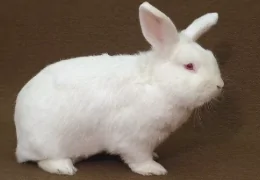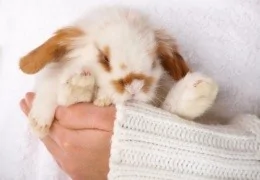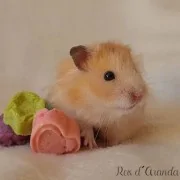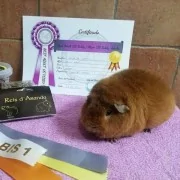Its name says it all: the Vienna blue rabbit comes from Austria. Not only is it beautiful with its shiny blue-grey...
MY RABBIT IS BLIND
INTRODUCTION
Yes, as with humans and other animals, blindness in rabbits can occur and it is important to recognise this condition in order to help your pet.
SYMPTOMS OF BLINDNESS IN RABBITS
Symptoms usually include:
- Pupils are always dilated or appear asymmetrical.
- Red or swollen eyes.
- The eye has a whitish colour, as if a greyish layer were in front of the lens (cataracts).
- Trips over or bumps into everything in his path.
- He is more easily startled by sounds than before.
- Does not pick up visual incentives.
- Acts very cautiously.
- Quickly becomes anxious when entering unfamiliar places.
- Walks very close to walls.
- Slow movements.
CAUSES OF BLINDNESS IN RABBITS
- AGE: As in humans, as the years go by, sight diminishes and sometimes rabbits lose it completely in one or both eyes.
- CATARACTS: Opacity or cloudiness in the lens of the eye causes blurred vision. Usually more common in older rabbits.
- ENCEPHALITOZOON CUNICULI (E.CUNI): Disease caused by an intracellular parasite that can trigger a series of health problems such as partial or complete paralysis, poor coordination, involvement of the heart, liver, lungs and kidneys, among others. One of the most common lesions it produces in the eye is phacoclastic uveitis, which affects the rabbit's vision.
- ABSCESOS: Accumulation of pus, which generates inflammation and pain. It originates as a result of an infection, and in order to protect itself the organism produces them in any part of the body. There may be retrobulbar abscesses (behind the eyeball), which can compress certain nerves, causing loss of vision, or even in some cases may cause the loss of vitality of the eyeball, requiring surgery. Normally retrobulbar abscesses are related to dental problems, so it is essential to have your rabbit periodically checked by your doctor.
- GLAUCOMA: An increase in intraocular pressure occurs, affecting the retina and preventing the regulation of fluid, causing an excess or lack of fluid. In the long term it causes blindness.
- TRAUMATISM: Severe trauma to the eye can result in loss of sight or complete loss of the eyeball.
- BORN BLIND: Being born blind is a congenital or hereditary condition which can be seen when the rabbit opens its eyes between 10 and 13 days of life, observing that they are whitish in colour.
CAN MY RABBIT LIVE A DIGNIFIED LIFE BEING BLIND?
Yes, blindness is not a reason to sacrifice an animal nor to think that it will not have a dignified life, as long as this discomfort does not cause it physical pain and we adapt our home and behaviour to its disability, our little rabbit will be very happy and will live the usual average life of any other rabbit (it also depends on the breed and the lifestyle and diet which it has), this being between 7 and 12 years.
HOW DO I ADAPT MY HOUSE FOR MY BLIND RABBIT?
It is essential that the order of things in your home is not altered. That is to say, do not change the distribution of objects and furniture unless they really pose a danger to the life of your rabbit when it comes out of its cage.
Remember that if he has been familiar with the space for years, he will know by heart where to move around, so any change you make, if he loses his vision, will be harmful to him. This will only make the rabbit feel more insecure and cause stress.
Simply put away objects that could hurt him.
It is also important to watch his steps at the beginning to help him if necessary. You should also examine his behaviour in the cage and how he interacts with the objects in the cage.
For example, be aware that the drip drinker is often at eye level, so if he is unfamiliar with it, he may hurt himself when he goes to drink.
If he needs more personal space, ideally you should act progressively. For example, by moving the rabbit's cage a few centimetres from time to time. At the same time, you should guide it little by little, without pressure, so that it gets used to it.
If your pet has only been at home for a short time and is not used to the space outside the cage, it is advisable that at first it has a delimited space and then you increase the perimeter.
It is very important to consider how you interact with a blind rabbit.
Ideally, as you approach it, you should speak to it in a soft voice so that it is aware of your presence and not do it all at once when you are already by its side. That could scare him a lot.
On the other hand, do not hold him in your arms unless it is strictly necessary, as he may feel very disorientated when you put him back on the ground. If you do hold your blind rabbit in your arms, then put it back in the same place.
CONCLUSION
When our pet develops or is born with a particular problem it is important that we do everything in our power to try to solve it or give it the best possible life style, even if that means changing our routine. It is extremely important to be responsible when we have an animal in our hands, but even more so when this animal is disabled, as it depends on us even more.
Leave a comment
Log in to post comments
















